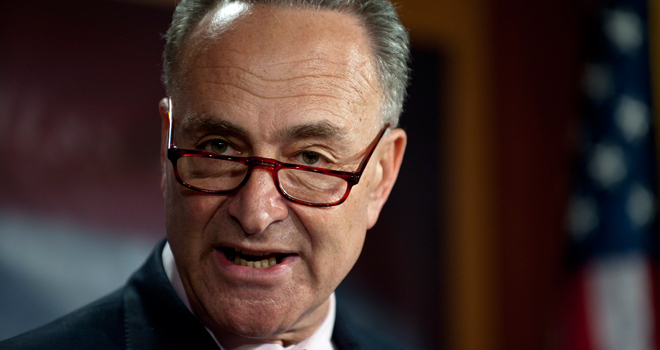U.S. Chief Justice John Roberts’ swing vote to uphold ‘Obamacare’ under Congress’s taxing powers has drawn praise from his usual critics. One top Democratic senator lauded Roberts’ “judicial independence” in saving President Obama’s signature law, but also argued that the Bush-appointed jurist broke his promise by narrowing the scope of the Commerce Clause.
In his opinion, Roberts explained in detail why he believes his view is not inconsistent with precedent, siding with conservative architects of the legal challenge in the argument that Congress may not regulate inaction.
“In my view it certainly merited upholding under the Commerce Clause,” said Sen. Chuck Schumer (D-NY), his party’s leader on messaging. “I do worry, in the future, about the courts limiting the Commerce Clause as a way of limiting the ability of the federal government to help average families.”
Although he upheld the health care law on another basis, Roberts sided with the court’s four conservatives in declaring that Congress may not, under the Commerce Clause, force people to engage in a market transaction. The five-member majority view effectively rewrites existing law. It’s the first time since before the 1942 case Wickard v. Filburn, a precedent that was affirmed in the 2005 case Gonzales v. Raich, that the Supreme Court has placed a limit on Congress’s authority make national economic regulation that substantially affects interstate commerce.
In 2005, during Roberts’ confirmation hearing, Schumer grilled the soon-to-be chief justice on whether he would support the legal framework established by Wickard.
“Now it was reaffirmed in the Raich case and that is a precedent of the court, just like Wickard, that I would apply like any other precedent,” Roberts said at the time. “I have no agenda to overturn it. I have no agenda to revisit it. It’s a precedent of the court.”
TPM asked Schumer whether Roberts went back on his word in the ‘Obamacare’ decision.
“Yes he did,” the senator said. “If you read his testimony about Wickard, about some of the other, more recent Commerce Clause cases at the hearing, and looked at what he said here, it’s quite different.”
Roberts’ counter-argument was that prior precedent is about regulating “activity,” while in ‘Obamacare’ the government wanted to regulate “inactivity” by compelling people into action. The latter, he decreed, does not pass muster under the Commerce Clause.
“Congress has never attempted to rely on that power to compel individuals not engaged in commerce to purchase an unwanted product,” the chief justice wrote. “Construing the Commerce Clause to permit Congress to regulate individuals precisely because they are doing nothing would open a new and potentially vast domain to congressional authority. … That is not the country the Framers of our Constitution envisioned.”
Even though ‘Obamacare’ has survived, the leading architect of the Republican challenge hailed Roberts’ new Commerce Clause jurisprudence as a major victory for proponents of limited government. The implication is that while Congress may continue to use its taxing power to encourage people into action, it may not use the Commerce Clause, under which it could have placed more severe, potentially criminal penalties for noncompliance.
Despite his gripes, Schumer was pleased Roberts “rose to the occasion and transcended politics.”
“In this case at least, the chief justice acted as the umpire that he promised to be,” the senator said. “Some have expressed surprise over his vote in this decision. But maybe we shouldn’t be so shocked. After all, he’s the most powerful conservative in Washington who doesn’t have to worry about the next election. Unlike the GOP’s elected leaders, Roberts can afford to follow the law rather than fret about his standing with the tea party.”






